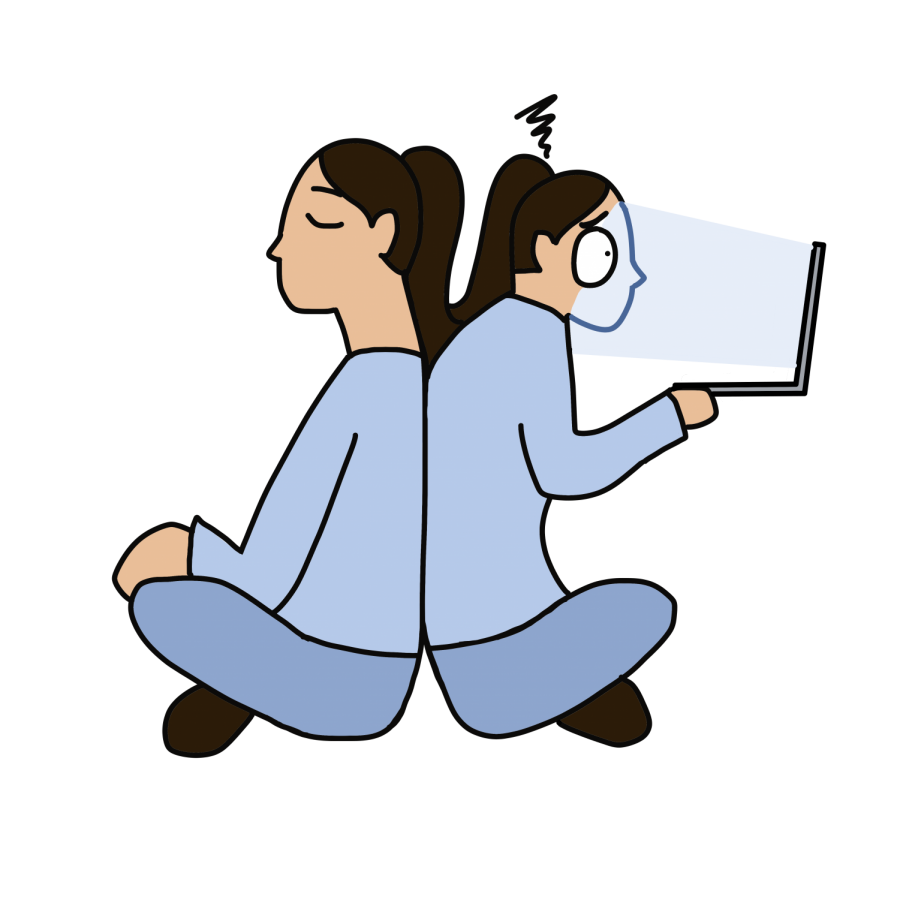Taking a break: Planning your day in quarantine
Taking the time to rest can often be difficult, especially when we often prioritize the completion of tasks over making space in our schedules for brief respites.
September 21, 2020
Every day since quarantine started, you find yourself exhausted after spending a day hunched over a screen, taking meeting after meeting. After school, you dive headfirst into a mountain of work, draining the rest of your energy. At the end of your hard work, you reward yourself with a long nap to compensate for the late-night study session.
Taking the time to rest can often be difficult, especially when we often prioritize the completion of tasks over making space in our schedules for brief respites. Director of Health Services Debra Nott suggests allocating specific times to disconnect from our work.
“I think we all know the importance of taking breaks, both for physical and emotional reasons. So why is it so hard to make it happen? I think it’s because we plan our work, but we don’t plan our rest,” Nott said. “It’s too easy, at the end of the day, to realize we have spent 90 percent of our time seated.”
Nott also emphasizes the importance of using breaks to maintain eye health. Because humans have developed to become adept at what we do most, when we spend too much time reading or staring at a screen, our eyes become accustomed to focusing up close, resulting in a loss of distance vision.
“During your class breaks, go outside and look far away. Throw a ball to your dog. Look at the mountains if you can see them through the smoke,” she said. “And about every 20 minutes or so, look up from your book or your laptop and look around the room and out a window.”
An alternate method of resting our eyes is napping, an ever-popular mode of relaxation that has become even more useful during quarantine. According to Dr. Manpreet Singh, an associate professor of psychiatry and behavioral sciences at the Lucile Salter Packard Children’s Hospital in Palo Alto, napping can help with sleep deficit and therefore can provide benefits for brain development in teens.
“Catch up sleep [is] really important for your brain development and your body if it’s needing more sleep. It’s probably first and foremost a developmental need,” Dr. Singh said. “Your brain is growing, so getting those naps in is actually really good for your brain development.”
In addition, according to the National Sleep Foundation, short 20-minute naps can improve performance, restore alertness and reduce mistakes and accidents. These “power naps” are the most beneficial when taken between 2 p.m. and 3 p.m. or right after lunch. However, not all naps have positive effects as longer slumbers can cause sleep inertia, a state of grogginess and disorientation after awakening from deep sleep, and can dysregulate your natural sleep cycle.
“If [naps] disrupt your sleep schedule too much, and it causes you to stay up later, and then you’re in that same vicious cycle, you end up losing the value of that restorative nap,” Dr. Singh said. “So regularity is really important in making sure that your naps are not interfering with your natural sleep-wake cycles so that you can get a good restful sleep at night.”
While we often view breaks as a chance to relax and “recharge our batteries,” many breaktime activities provide numerous benefits in other aspects of wellness. Even the shortest breaks have the potential to be fruitful. Nott suggests using passing periods and class breaks for simple exercises such as jumping jacks, which take minimal time and can increase heart rate quickly. Psychology teacher Dr. Julie Turchin also highlights the mental benefits of exercise.
“For a lot of people, exercise puts you in a state that we call flow, which is almost like a meditative state. It’s something that you can do that engages your body and your mind but not in a way [where] you have to think really hard, but you’re also not bored,” Dr. Turchin said. “And it turns out that spending time in that flow state is good for our well being and mental health too.”
According to Headspace, an online healthcare company, among the benefits of achieving flow state are a heavy sense of concentration, a sense of clarity, freedom from worry and positive emotions such as happiness, qualities that enhance learning abilities and overall mental health.
In addition to mental benefits, taking care of your body through certain activities can lead to developing a keystone habit, a practice that leads to other beneficial actions. For example, exercising regularly may cause changes in a person’s diet, provide more energy throughout the day and improve the quality of sleep.
“When you hear exercise is important, it’s not really just that exercise is important,” Dr. Turchin said. “It’s also that people who exercise regularly seem to then build these other good habits of nutrition, sleep, stress reduction [and] routine. And everything together has this really outsized effect.”


















![“[Building nerf blasters] became this outlet of creativity for me that hasn't been matched by anything else. The process [of] making a build complete to your desire is such a painstakingly difficult process, but I've had to learn from [the skills needed from] soldering to proper painting. There's so many different options for everything, if you think about it, it exists. The best part is [that] if it doesn't exist, you can build it yourself," Ishaan Parate said.](https://harkeraquila.com/wp-content/uploads/2022/08/DSC_8149-900x604.jpg)




![“When I came into high school, I was ready to be a follower. But DECA was a game changer for me. It helped me overcome my fear of public speaking, and it's played such a major role in who I've become today. To be able to successfully lead a chapter of 150 students, an officer team and be one of the upperclassmen I once really admired is something I'm [really] proud of,” Anvitha Tummala ('21) said.](https://harkeraquila.com/wp-content/uploads/2021/07/Screen-Shot-2021-07-25-at-9.50.05-AM-900x594.png)







![“I think getting up in the morning and having a sense of purpose [is exciting]. I think without a certain amount of drive, life is kind of obsolete and mundane, and I think having that every single day is what makes each day unique and kind of makes life exciting,” Neymika Jain (12) said.](https://harkeraquila.com/wp-content/uploads/2017/06/Screen-Shot-2017-06-03-at-4.54.16-PM.png)








![“My slogan is ‘slow feet, don’t eat, and I’m hungry.’ You need to run fast to get where you are–you aren't going to get those championships if you aren't fast,” Angel Cervantes (12) said. “I want to do well in school on my tests and in track and win championships for my team. I live by that, [and] I can do that anywhere: in the classroom or on the field.”](https://harkeraquila.com/wp-content/uploads/2018/06/DSC5146-900x601.jpg)
![“[Volleyball has] taught me how to fall correctly, and another thing it taught is that you don’t have to be the best at something to be good at it. If you just hit the ball in a smart way, then it still scores points and you’re good at it. You could be a background player and still make a much bigger impact on the team than you would think,” Anya Gert (’20) said.](https://harkeraquila.com/wp-content/uploads/2020/06/AnnaGert_JinTuan_HoHPhotoEdited-600x900.jpeg)

![“I'm not nearly there yet, but [my confidence has] definitely been getting better since I was pretty shy and timid coming into Harker my freshman year. I know that there's a lot of people that are really confident in what they do, and I really admire them. Everyone's so driven and that has really pushed me to kind of try to find my own place in high school and be more confident,” Alyssa Huang (’20) said.](https://harkeraquila.com/wp-content/uploads/2020/06/AlyssaHuang_EmilyChen_HoHPhoto-900x749.jpeg)











